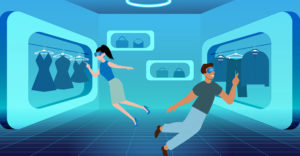Amit Ben is the CTO and cofounder of Nanorep.
In this exclusive interview, Ben explains how companies that offer highly automated self-service tools can make the customer experience highly personal.

CRM Buyer: What is personalized self-service, and why is it important?
Amit Ben:
When you provide service, it can be either completely general, or contextual — which means it’s different for different demographics. Personalized service means that you get to the most fine-grained resolution possible.
It’s self-service that can be catered and adjusted dynamically to each person experiencing that service. People really want to get the feeling that someone hears and understands their own personal problems.
CRM Buyer: How can a customer service platform be anticipatory?
Ben:
You need to learn the behavioral patterns of users, and once an organization understands these behavioral patterns, it can take preventative actions, provide actionable items, or offer options to alleviate the issue.
The general understanding is that people don’t do one isolated action on their journey. It’s complicated, and the flow between different actions is important. You need to ask multiple questions throughout a customer’s journey.
In some cases, for instance, when people ask a specific question, another question immediately follows. If a bot can provide that question, it creates a much more fluent experience. That’s something you’d expect a human sales agent to be able to do, but if you leverage data you can easily spot those on the digital channel as well.
CRM Buyer: What are some recent advances in artificial intelligence, machine learning, and natural language processing that are shaping this field?
Ben:
We’re having an AI renaissance. We see it all over the place. We see voice interfaces and personal assistants becoming ubiquitous. Advances in technology are reaching a point where it’s almost becoming difficult to tell if you’re talking to a virtual agent or a real one.
It allows us to create richer experiences, and over time we’ll see these experiences become more complex and broader reaching. It will have a huge impact on day-to-day life.
The bigger challenge is creating a changing field of knowledge solution. Mostly, the biggest players have virtual agents that have a set of capabilities, but chatbot providers are struggling to create a rich experience.
You need a unique mix to leverage hundreds of customers and interactions in unique ways to create dense models. This is going to be what the industry will focus on — the capability to provide rich experiences.
CRM Buyer: What is the key to making automated customer service feel human?
Ben:
What you’re touching on is a common misconception. We want it to feel effective. We don’t want it to feel human. The race to make a chatbot feel human detracts from its effectiveness. It’s not human. When you try to blur that line, you create friction.
What we usually recommend is for organizations to focus on the value that they’re providing. It’s like with an app. You don’t want it to be human. You want it to be useful. You don’t even want to limit it to what’s human. Once you do that, you’re really free to leverage the capabilities of the chatbot or technology and play to its strengths.
A bot should be concise and to-the-point, and it should provide options in case it’s not able to provide what the customer needs. Instead of expecting it to act human, let’s leverage the capabilities of the machine. This is one of the signifiers of a maturing interface. We’re still trying to make it similar to an older interface. What’s really liberating is when we release the old and embrace the new.
Every medium has its strengths, so bots will do some things better than humans, but sometimes for other things a chatbot will be better. What we’ll see as the industry matures is that different experiences will be delegated to the right interfaces or mediums. Creating a user experience between all these will be a key value differentiator for any brand.
CRM Buyer: How would you describe the relationship between customer service, customer experience and CRM? How can information captured through customer interactions help on the CRM side?
Ben:
Over time, what we’re seeing is a consolidation of all of these technologies. Everything is going to flow into one single point, where the more we know about the consumer, the more everybody benefits.
The knowledge we extract also improves the customer experience. It can go to service, sales and marketing. We can see what products a user is interested in, and we’ll hand over the conversation to a human agent, along with the information that was collected.
The integration between all of these endpoints is going to be crucial moving forward, and it’s going to drive the most value. Migrating the knowledge that’s been collected and closing the loop are crucial. Data is going to be critical, and the flow of data between all of these systems is critical. The more we know, the better the experience we can provide.


























































Social CRM
See all Social CRM